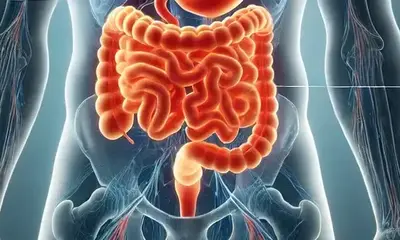Jane, a 52-year-old woman who has been experiencing persistent abdominal pain and unexpected weight loss for the last few months. Despite switching to a healthier diet, the discomfort doesn’t go away. After a series of tests, Jane receives the diagnosis: small intestine cancer. It’s a rare condition, but catching it early means that treatments can be more effective.
Symptom Breakdown: What to Look Out For
Small intestine cancer often goes undetected in its early stages because the symptoms can be vague and easily mistaken for other digestive issues. However, recognizing the key signs early on can make a big difference in treatment outcomes. Some common symptoms include:
- Abdominal pain: Persistent discomfort or cramping in the stomach area.
- Unexplained weight loss: A sudden drop in weight without any changes to diet or exercise.
- Nausea and vomiting: Frequent feelings of sickness or actual vomiting, especially after meals.
- Blood in stool: Dark or tarry stools, which can indicate bleeding in the digestive tract.
- Fatigue: Unexplained tiredness, often due to anemia caused by internal bleeding.
These symptoms may lead to more serious complications, such as bowel obstruction, which can be life-threatening if not treated promptly.
Types of Small Intestine Cancer
Small intestine cancer can take on several different forms, each with its own characteristics and treatment protocols. Knowing the specific type is crucial for developing a personalized treatment plan.
| Type of Cancer | Description | Common Treatments |
|---|---|---|
| Adenocarcinoma | Begins in the glandular cells lining the intestine. Most common type of small bowel cancer. | Surgery, chemotherapy, targeted therapy |
| Carcinoid Tumors | Slow-growing tumors that develop from hormone-producing cells. | Surgery, hormone therapy, targeted therapy |
| Gastrointestinal Stromal Tumors (GIST) | Rare tumors that form in the digestive tract’s connective tissue. | Surgery, targeted drug therapy |
| Lymphoma | Cancer that begins in the immune system cells in the intestine. | Chemotherapy, radiation therapy, immunotherapy |
| Sarcoma | Develops in the soft tissue of the intestine. | Surgery, chemotherapy |
Diagnostic Path: How Small Intestine Cancer is Diagnosed
Diagnosing small intestine cancer often requires several tests, as the symptoms can mimic other gastrointestinal issues. Here’s how the diagnostic process typically unfolds:
- Endoscopy or Colonoscopy: These procedures allow doctors to visually inspect the intestine for tumors or abnormalities.
- Biopsy: A small tissue sample may be taken during an endoscopy for further analysis under a microscope to confirm cancer.
- Imaging Tests: CT scans, MRI, or PET scans provide detailed images of the small intestine and help determine the size and spread of the tumor.
- Blood Tests: Some markers in the blood may indicate cancer, but this is usually supplementary to other tests.
Deep Dive: Factors That Influence Small Intestine Cancer
The small intestine is often overlooked compared to the stomach or colon, but it plays a vital role in digestion. Several factors can contribute to the development of cancer in this area:
- Genetics: Some inherited conditions, like Lynch syndrome, increase the risk of small intestine cancer.
- Diet: High-fat diets, particularly those rich in processed meats, have been linked to a higher risk of gastrointestinal cancers.
- Smoking: Smoking has been shown to increase the risk of several cancers, including those of the small intestine.
- Inflammatory Bowel Disease (IBD): Conditions like Crohn’s disease may heighten the risk of developing small bowel cancer.
Treatment Comparison: What Are Your Options?
Treatment for small intestine cancer depends on the stage of the disease and the overall health of the patient. Here’s a comparison of the most common treatment methods:
- Surgery: Often the first option, especially if the cancer is localized. Surgery aims to remove the tumor and some surrounding tissue to ensure no cancer cells remain.
- Chemotherapy: For more advanced cases, chemotherapy may be used to kill cancer cells throughout the body. It’s often used in combination with surgery.
- Targeted Therapy: Drugs that specifically attack cancer cells without harming normal cells. This is particularly effective for certain types like GIST and adenocarcinoma.
- Radiation Therapy: Sometimes used in combination with surgery or chemotherapy, radiation targets the cancerous cells directly and can shrink tumors before surgery.
Outcome Story: Hope for Recovery
Consider Daniel, a 45-year-old man diagnosed with a gastrointestinal stromal tumor (GIST). After undergoing surgery to remove the tumor, he was prescribed targeted therapy to prevent any recurrence. With regular follow-ups and a personalized treatment plan, Daniel has been cancer-free for two years. His story underscores the importance of early detection and the role of targeted therapies in treating rare cancers.
Don’t Ignore Persistent Symptoms
Small intestine cancer is rare, but the earlier it’s detected, the better the chances of successful treatment. If you’re experiencing persistent abdominal pain, weight loss, or any of the other symptoms listed above, it’s important to consult with a healthcare professional. Early diagnosis, combined with a targeted treatment plan, offers the best chance for recovery.









